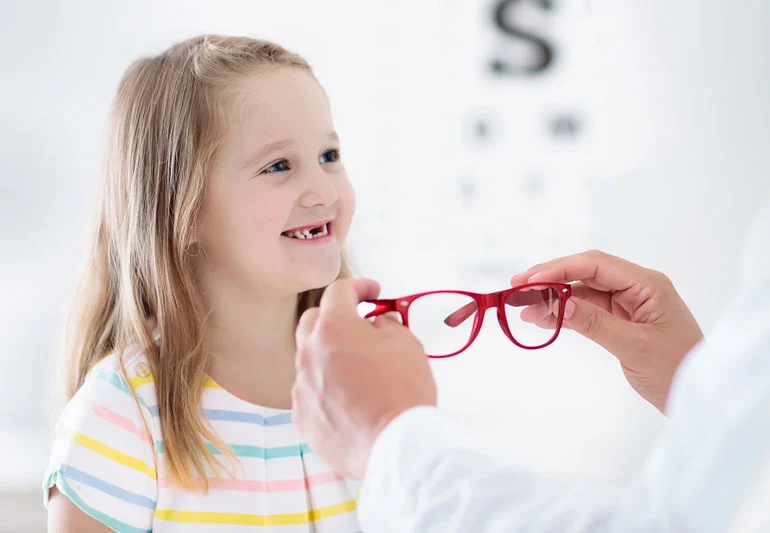As a parent, you want to ensure your child is healthy and thriving. While you may be vigilant about your child’s diet, exercise, and overall well-being, one area that is often overlooked is their eye health. Eye problems can develop slowly over time and go unnoticed by parents and children. That’s why regular eye checkups are so important. Here are some reasons why:
School vision screenings are not enough:
While school vision screenings can detect some vision problems, they are not a substitute for a comprehensive eye exam. School screenings often only test for distance vision and do not assess other important visual skills such as eye tracking and teaming.
Children may not be aware of their vision problems:
Children may not realize they have a vision problem, as they may assume that their vision is normal. They may not be able to recognize the symptoms of a vision problem, which is why regular eye exams are so important.
Early Detection of Vision Problems:
Children may not be aware of any vision problems they are experiencing, and in some cases, they may not even realize that they have a problem. Regular eye checkups can detect vision problems early on, allowing for prompt treatment and management. This can prevent the condition from worsening and help preserve your child’s vision.
Preventing Academic and Social Struggles:
Undiagnosed vision problems can affect a child’s academic performance and social interactions. Children who struggle to see the board or read books may fall behind in their studies, which can lead to frustration and a lack of confidence. Poor vision can also affect a child’s ability to play sports and other activities. Regular eye checkups can ensure that your child’s vision is functioning optimally, allowing them to perform well academically and socially.
Detecting Eye Diseases:
Certain eye diseases, such as glaucoma and cataracts, can develop without any symptoms. Regular eye checkups can detect these conditions early on, allowing for prompt treatment and management. Early detection and treatment can help prevent vision loss and other complications.
Ensuring Proper Eye Development:
Children’s eyes are still developing, and regular eye checkups can ensure that their eyes are developing properly. Eye problems, such as amblyopia (lazy eye) and strabismus (crossed eyes), can be detected and treated early on, preventing long-term vision problems.
Building a Lifetime Habit of Eye Care:
Regular eye checkups can help your child develop good habits when it comes to eye care. Making eye checkups a regular part of their healthcare routine will make them more likely to continue taking care of their eyes as they grow older. This can help prevent vision problems from developing in adulthood.
In conclusion, regular eye checkups are crucial for maintaining your child’s eye health. By detecting vision problems early on, preventing academic and social struggles, detecting eye diseases, ensuring proper eye development, and building a lifetime habit of eye care, you can help save your child’s vision. Make sure to schedule regular eye checkups for your child with an eye doctor or optometrist.

 Lifestyle Changes That Could Help Lessen the Effects of Alzheimer’s
Lifestyle Changes That Could Help Lessen the Effects of Alzheimer’s  Bodyweight Basics: The Best No-Equipment Exercises for Beginners
Bodyweight Basics: The Best No-Equipment Exercises for Beginners  THC Gummies vs THC Tinctures – Which works faster?
THC Gummies vs THC Tinctures – Which works faster?  What Are the Best Treatment Options for Diabetic Retinopathy?
What Are the Best Treatment Options for Diabetic Retinopathy?  Is it Safe to Get a Massage While Pregnant?
Is it Safe to Get a Massage While Pregnant?  Maximize Your Fitness Goals: How a Personal Trainer Can Help You Achieve Lasting Results
Maximize Your Fitness Goals: How a Personal Trainer Can Help You Achieve Lasting Results  Maximize Savings and Benefits with the Right Health Insurance Services
Maximize Savings and Benefits with the Right Health Insurance Services  What is the purpose of a spinal adjustment?
What is the purpose of a spinal adjustment?  Understanding The Different Types Of Incontinence And How Home Care Can Help
Understanding The Different Types Of Incontinence And How Home Care Can Help 